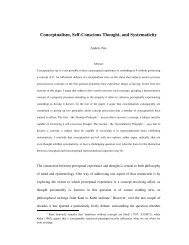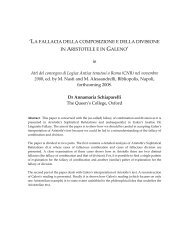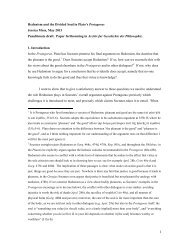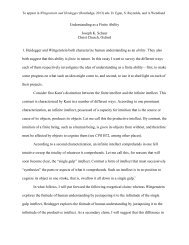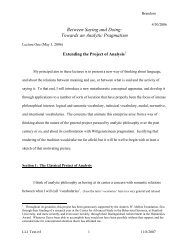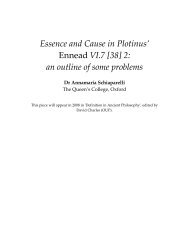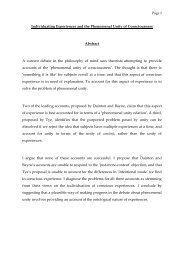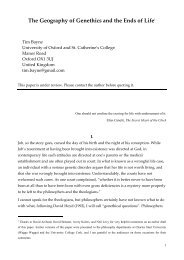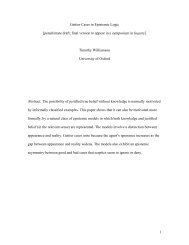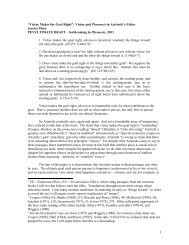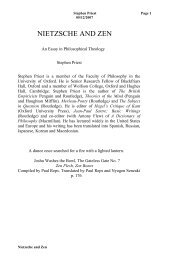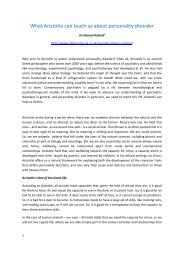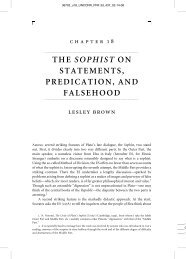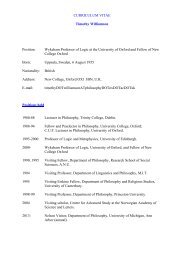de se knowledge and the possibility of an omniscient being
de se knowledge and the possibility of an omniscient being
de se knowledge and the possibility of an omniscient being
You also want an ePaper? Increase the reach of your titles
YUMPU automatically turns print PDFs into web optimized ePapers that Google loves.
194 Faith <strong><strong>an</strong>d</strong> Philosophy<br />
since <strong>the</strong> haecceity entailedc by <strong>the</strong> first-person proposition is mine, not<br />
S’s. This allows Wierenga to reject premi<strong>se</strong> (2) <strong>of</strong> Grim’s argument since<br />
someone el<strong>se</strong> c<strong>an</strong> know what I know in knowing (F).<br />
It is true that if <strong>the</strong> proponent <strong>of</strong> first-person propositions rejects Chisholm’s<br />
Corollary, he <strong>the</strong>reby avoids Grim’s objection to omniscience.<br />
However, in rejecting <strong>the</strong> Corollary he also introduces subst<strong>an</strong>tial difficulties<br />
for his <strong>the</strong>ory. Recall that one <strong>of</strong> <strong>the</strong> main reasons for positing<br />
<strong>de</strong> <strong>se</strong> belief in <strong>the</strong> first place was to explain differences in behavior. It<br />
is only when I realize that my hair is on fire that I jump into <strong>the</strong> pool.<br />
If we reject Chisholm’s Corollary, we lo<strong>se</strong> <strong>the</strong> ability to explain differences<br />
in behavior in terms <strong>of</strong> differences in content. 13 According to <strong>the</strong><br />
view un<strong>de</strong>r consi<strong>de</strong>ration, when I know (F) I know some first-person<br />
proposition that entailsc <strong>the</strong> conjunction <strong>of</strong> my haecceity <strong><strong>an</strong>d</strong> <strong>the</strong> property<br />
<strong>of</strong> having hair that is on fire. Suppo<strong>se</strong> that someone el<strong>se</strong> at <strong>the</strong> party,<br />
Sus<strong>an</strong>, is also able to grasp this first-person proposition. She will grasp<br />
a proposition that entails c<br />
my haecceity <strong><strong>an</strong>d</strong> <strong>the</strong> property <strong>of</strong> having hair<br />
that is on fire. Knowing this proposition will not lead her to jump in <strong>the</strong><br />
pool. The content <strong>of</strong> her <strong>knowledge</strong> will be <strong>the</strong> same as <strong>the</strong> content <strong>of</strong><br />
my <strong>knowledge</strong>, but her behavior will be different from my behavior. 14<br />
Therefore, rejecting Chisholm’s Corollary me<strong>an</strong>s rejecting <strong>the</strong> plausible<br />
supposition that differences in behavior are explainable in terms <strong>of</strong> differences<br />
in content.<br />
Secondly, <strong>an</strong> example from David Lewis shows that (W) is <strong>an</strong> unacceptable<br />
reduction <strong>of</strong> <strong>de</strong> <strong>se</strong> <strong>knowledge</strong> to <strong>de</strong> dicto <strong>knowledge</strong>. Lewis writes:<br />
Consi<strong>de</strong>r <strong>the</strong> ca<strong>se</strong> <strong>of</strong> two gods. They inhabit a certain possible world,<br />
<strong><strong>an</strong>d</strong> <strong>the</strong>y know exactly which world it is. Therefore <strong>the</strong>y know every<br />
proposition that is true at <strong>the</strong>ir world. Ins<strong>of</strong>ar as <strong>knowledge</strong> is a<br />
propositional attitu<strong>de</strong>, <strong>the</strong>y are <strong>omniscient</strong>. Still I c<strong>an</strong> imagine <strong>the</strong>m<br />
to suffer ignor<strong>an</strong>ce: nei<strong>the</strong>r one knows which <strong>of</strong> <strong>the</strong> two he is. They<br />
are not exactly alike. One lives on top <strong>of</strong> <strong>the</strong> tallest mountain <strong><strong>an</strong>d</strong><br />
throws down m<strong>an</strong>na; <strong>the</strong> o<strong>the</strong>r lives on top <strong>of</strong> <strong>the</strong> col<strong>de</strong>st mountain<br />
<strong><strong>an</strong>d</strong> throws down thun<strong>de</strong>rbolts. Nei<strong>the</strong>r one knows whe<strong>the</strong>r he lives<br />
on <strong>the</strong> tallest mountain or on <strong>the</strong> col<strong>de</strong>st mountain; nor whe<strong>the</strong>r he<br />
throws m<strong>an</strong>na or thun<strong>de</strong>rbolts. 15<br />
Since both gods know every proposition, <strong>the</strong>y both know every firstperson<br />
proposition. Let us refer to <strong>the</strong> haecceity <strong>of</strong> <strong>the</strong> god on <strong>the</strong> tallest<br />
mountain as ‘H.’ Call <strong>the</strong> proposition that entailsc <strong>the</strong> conjunction <strong>of</strong> H<br />
<strong><strong>an</strong>d</strong> <strong>the</strong> property <strong>of</strong> <strong>being</strong> on <strong>the</strong> tallest mountain ‘p.’ Both gods know p.<br />
By (W), <strong>the</strong> god on <strong>the</strong> tallest mountain’s <strong>knowledge</strong> <strong>of</strong> p is <strong>de</strong> <strong>se</strong> <strong>knowledge</strong>,<br />
whereas <strong>the</strong> god on <strong>the</strong> col<strong>de</strong>st mountain’s <strong>knowledge</strong> <strong>of</strong> p is not <strong>de</strong><br />
<strong>se</strong>, since p entailsc <strong>the</strong> former god’s haecceity <strong><strong>an</strong>d</strong> not <strong>the</strong> latter’s. But even<br />
though <strong>the</strong> god on <strong>the</strong> tallest mountain’s <strong>knowledge</strong> <strong>of</strong> p amounts to <strong>de</strong> <strong>se</strong><br />
<strong>knowledge</strong> according to (W), he still doesn’t know where he is by knowing<br />
only propositions. In or<strong>de</strong>r to know where he is, he would have to<br />
know that H is his haecceity. The fact that (W) entails that <strong>the</strong> god has <strong>de</strong> <strong>se</strong><br />
<strong>knowledge</strong>, even though he still doesn’t know where he is, <strong>de</strong>monstrates<br />
that <strong>the</strong> propo<strong>se</strong>d reduction <strong>of</strong> <strong>de</strong> <strong>se</strong> to <strong>de</strong> dicto fails. 16



